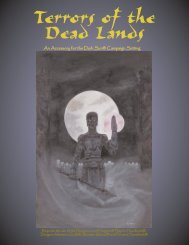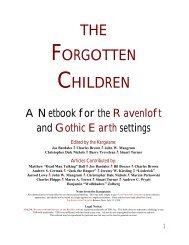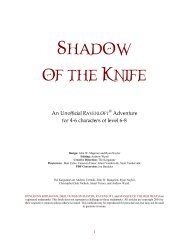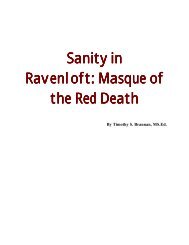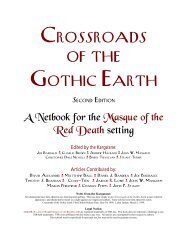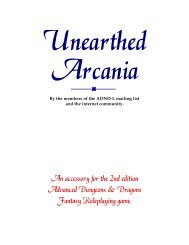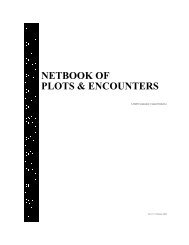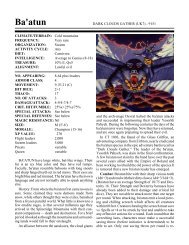You also want an ePaper? Increase the reach of your titles
YUMPU automatically turns print PDFs into web optimized ePapers that Google loves.
Mubonyete<br />
A Misconception of Power in a Parched Land<br />
T<br />
he power of the land rests in its ability<br />
to create and destroy, to give back to<br />
itself what it itself has taken away.<br />
Man in many ways knows this lesson<br />
so well: take from the land what you need, and<br />
the land will give you more than you deserve.<br />
We know too much of the consequences of<br />
abusing the land's bounty; nature can be a loving<br />
as well as a wrathful entity. In the parched,<br />
colored regions of the Brambled Karoo, what<br />
little left to be given back to the land is taken<br />
away to become fodder for an ambitious<br />
intention, destroying the land and its inhabitants<br />
even more.<br />
The Land<br />
Of all the domains hidden in the<br />
swirling Mists of Ravenloft, perhaps none is<br />
more exotic and wild as Mubonyete, the land of<br />
the Brambled Karoo. It extends 225 miles from<br />
north to south, east to west, and harbors a<br />
climate that supports life and at the same time<br />
destroys it. At daytime the sun beats mercilessly<br />
down with its heat, while the nights could be<br />
unusually cold.<br />
Mubonyete is mostly grassland, where a<br />
wide array of animals such as zebras,<br />
wildebeests, giraffes and great cats roam, survive<br />
and devour each other. Rainfall is sparse: at most<br />
the domain only gets about 10 centimeters of<br />
rainfall each year. This however, has not deterred<br />
the appearance of waterholes throughout the<br />
Karoo, where different species of wildlife find<br />
nourishment to their thirst. Even then, animals<br />
can always find a permanent source of water to<br />
the southeast of the realm, called the Feathered<br />
Marshes, named after the multitude of birds<br />
which flock almost daily to the area.<br />
There are three main humanoid<br />
settlements in Mubonyete. To the north lies<br />
Dhabo, The Clustered Kingdoms, a collection of<br />
seven walled cities with a total population of<br />
6000. A single walled kingdom named<br />
Gombasha, with a population of 2500, lies in the<br />
Feathered Marshes. A third settlement named<br />
Kifiru, with a population of 700, lies to the west.<br />
Scattered throughout the Karoo are<br />
small nomadic settlements, each capable of<br />
holding ten to seventy people. A wide, circular<br />
bramble fence called a boma, which serves as<br />
protection from fierce predators, surrounds these<br />
temporary settlements, made of thatched grass<br />
and/or mud-bricks.<br />
Another place of interest lies further<br />
west, named the Bone Citadel. Once, it could<br />
have been a beautiful place with an aura of<br />
magic; now, however, it lies barren and is<br />
considered forbidden.<br />
The Folk<br />
The inhabitants of this exotic land are<br />
dark-skinned, with varying heights. They have<br />
curly black hair and live in temporary homes,<br />
with the exception of the folk living in the<br />
permanent settlements mentioned. The<br />
occasional few who have long hair wear them in<br />
intricate braids. To distinguish rank, tribe and<br />
even faith, the people dress in thin yet richlywoven<br />
robes patched with abstract colored<br />
designs. Women and even men pierce and tattoo<br />
many parts of their bodies (ears, arms and lips)<br />
as a sign of beauty.<br />
Families and friends are close-knit<br />
systems. Within each walled city as many as<br />
3000 can live without fear of poor sanitation.<br />
Visitors to the land, however, may feel uneasy at<br />
the sight of twenty family members sharing the<br />
same hut.<br />
Mubonyete folk have an animistic<br />
world-view: everything has an orisha, or spirit,



